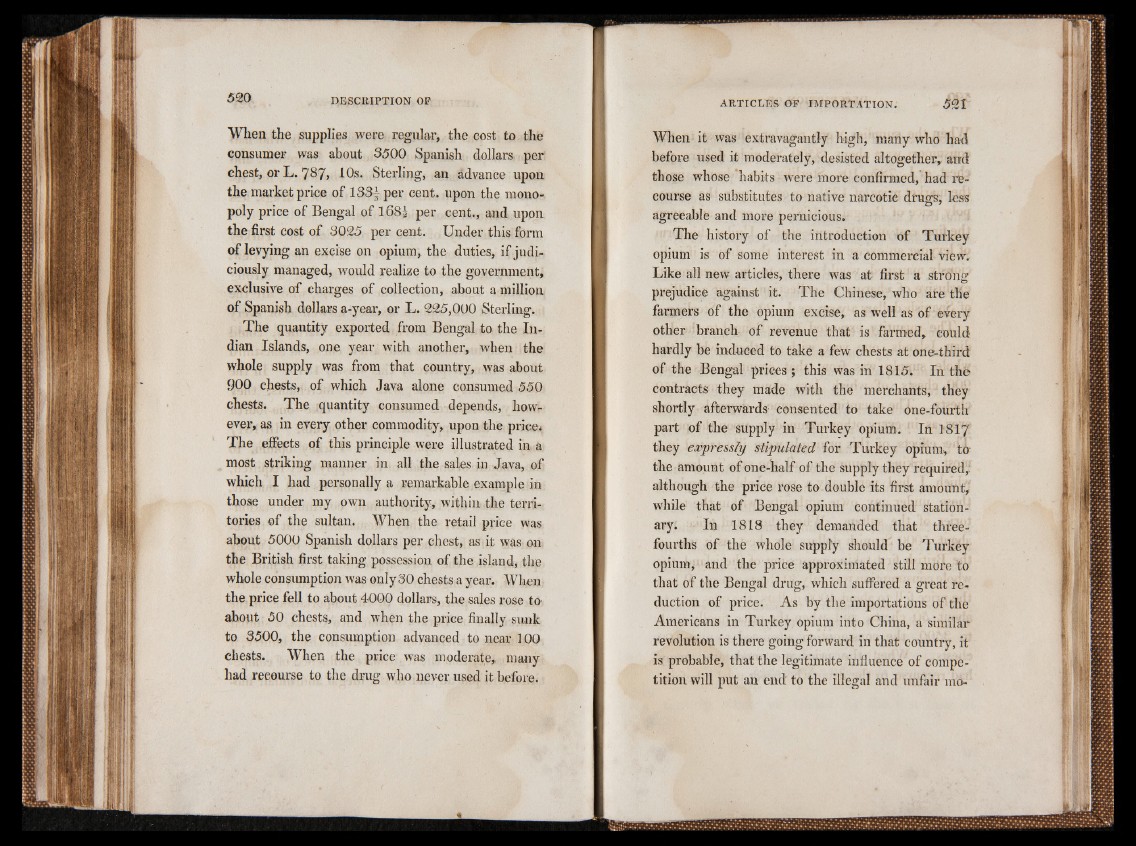
When the supplies were regular, the cost to the
consumer was about 3500 Spanish dollars per
chest, or L. 7&7> 10s. Sterling, an advance upon
the market price of 133\ per cent, upon the monopoly
price of Bengal of l68i per cent., and upon
the first cost of 3025 per cent. Under this form
of levying an excise on opium, the duties, if judiciously
managed, would realize to the government,
exclusive of charges of collection, about a million
of Spanish dollars a-year, or L. 225,000 Sterling.
The quantity exported from Bengal to the Indian
Islands, one year with another, when the
whole supply was from that country, was about
900 chests, of which Java alone consumed 550
chests. The quantity consumed depends, however,
as in every other commodity, upon the price*
The effects of this principle were illustrated in a
most striking manner in all the sales in Java, of
which I had personally a remarkable example in
those under my own authority, within the territories
of the sultan. When the retail price was
about 5000 Spanish dollars per chest, as it was on
the British first taking possession of the island, the
whole consumption was only 30 chests a year. When
the price fell to about 4000 dollars, the sales rose to'
about 50 chests, and when the price finally sunk
to 3500, the consumption advanced to near 100
chests. When the price was moderate,, many
had recourse to the drug who never used it before.
When it was extravagantly high, many who had
before used it moderately, desisted altogether, and
those whose habits were more confirmed, had recourse
as substitutes to native narcotic druaOr s7, less agreeable and more pernicious.
The history of the introduction of Turkey
opium is of some interest in a commercial view.
Like all new articles, there was at first a strong
prejudice against it. The Chinese, who are the
farmers of the opium excise, as well as of every
other branch of revenue that is farmed, could
hardly be induced to take a few chests at one-third
of the Bengal prices ; this was in 1815. In the
contracts they made with the merchants, they
shortly afterwards consented to take one-fourth
part of the supply in Turkey opium. In 1817
they expressly stipulated for Turkey opium, to
the amount of one-half of the supply they required,
although the price rose to double its first amount,
while that of Bengal opium continued stationary.
In 1818 they demanded that three-
fourths of the whole supply should be Turkey
opium, and the price approximated still more to
that of the Bengal drug, which suffered a great reduction
of price. As by the importations of the
Americans in Turkey opium into China, a similar
revolution is there going forward in that country, it
is probable, that the legitimate influence of competition
will put an end to the illegal and unfair mo